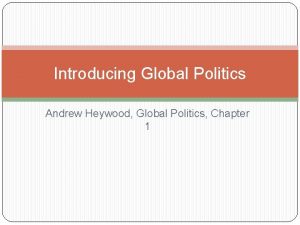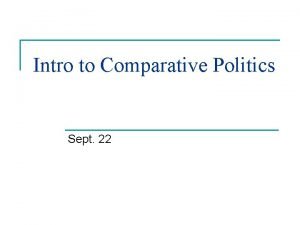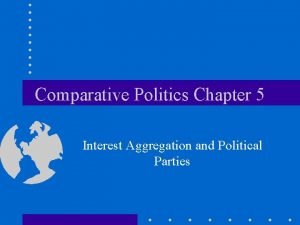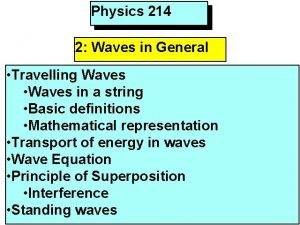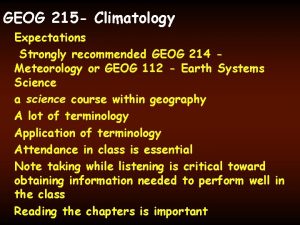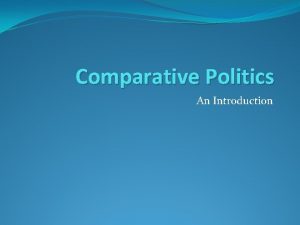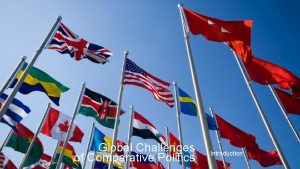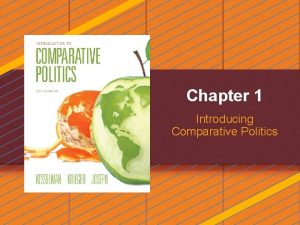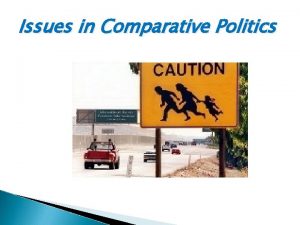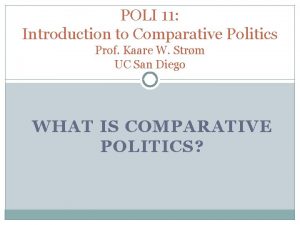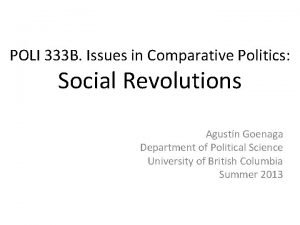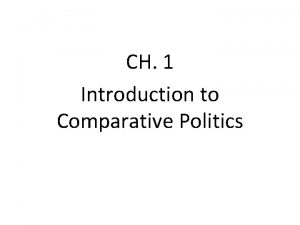POLI 214 Introduction to Comparative Politics Session 12

























- Slides: 25

POLI 214 Introduction to Comparative Politics Session 12 globalization PART II Lecturer: Dr. Maame Adwoa A. Gyekye-Jandoh Contact Information: mgyekyej@yahoo. com College of Education School of Continuing and Distance Education 2014/2015 – 2016/2017

Session Overview • This final session will examine the phenomenon of economic as well as social globalization. The session will also delve into the dynamics of old and new globalization, or globalization, past and present. • Thus the impact of globalization on trade and investment will be examined, as well as globalization and identity, and civil society in a globalized world. • Finally, we will look at the history of globalization and explain how the globalization of today is similar to that of yesterday. Slide 2

Session Outline The key topics to be covered in this final session are as follows: • Topic One: Economic globalization • Topic Two: Social globalization • Topic Three: globalization: Past and Present Slide 3

Reading List • O’Neil, Patrick H. 2007. Essentials of Comparative Politics. New York and London: W. W. Norton & Company. • Harold, Andrew, Tuathail, Gearoid O. and Susan M. Roberts. 1998. An Unruly World? globalization, Governance and Geography. London: Routledge. • Keohane, Robert O. and Joseph S. Nye, Jr. 2000. “Introduction, ” in Joseph S. Nye, Jr. and John. D. Donahue, eds. Governance in a Globalising World. Washington: Brookings Institution Press. • Held, David. 1995. Democracy and the Global Order. Cambridge: Polity Press. • Kaldor, Mary. 2003. Global Civil Society: An Answer to War. Cambridge: Polity. • Barber, Benjamin. 1995. Jihad versus Mc. World: How Globalism and Tribalism Are Reshaping the World. New York: Random House. Slide 4

Topic One ECONOMIC GLOBALIZATION Slide 5

Globalization and Trade • Globalization has led to increased volume of international trade in recent times. It is reported that world exports in goods and services nearly doubled in size from $6. 6 trillion in 1996 to nearly $12 trillion in 2005 (O’Neil, 2007). • The increase in international trade is as a result of more liberalization and free trade, technological advancement and transformation of world politics as a result of the end of the cold war. Technological advancement has reduced many of the traditional barriers to trade. • Therefore, markets are more open and global competition is enhanced. A business in Ghana or Dubai can now market its goods and services worldwide. This process was greatly influenced by the formation of the World Trade Organisation (WTO) and the increasing number of regional economic integration blocs that encouraged trading among themselves. Slide 6

Globalization and Investment • Globalization has led to unprecedented increase in investment in recent times. As a result of the liberalization of global markets, firms and funds now move into markets overseas in pursuit of greater profits. • It is reported that Foreign Direct Investment (FDI) increased from 7 per cent of World GDP in 1980 to 23 per cent in 2003. Free trade, open markets and reduced transportation costs have made it possible for large MNCs such as Honda, Toyota, Toshiba etc. to invest billions of dollars in markets all over the world. • What is more, technological advancement in online banking and investment has allowed people to move their money internationally with a few mouse clicks. Slide 7

In Summary • Economic globalization is manifested by increased global trade and investment. The removal of trade barriers following years of protectionism suddenly opened the global economy for trade. • The interconnectivity of the world has also facilitated free movement of capital across the world. Global investment has recorded unprecedented high figures in the last two decades. Slide 8

Questions to Consider • Explain how globalization has led to increased global trade. • Critically discuss the increase in global investment in the last two decades. • What is economic globalization? Slide 9

Topic Two SOCIAL GLOBALIZATION Slide 10

Globalization and Identity • The process of societal globalization has weakened traditional societal institutions, such as creating new identities that do not belong to any one community or nation. • Advancement in technology, increased migration of people worldwide, international commerce and communication have now connected people across vast distances, establishing relationships between people on the basis of common interest and ideas rather than shared national symbols. Slide 11

Globalization and Identity (contd. ) • Internet blogging through Facebook, Twitter and other networks have created a global platform for citizens across the world to connect and socialize without respect to boundaries, language or religion. • This process has contributed to global multiculturalism as a result of the international connections between people of different cultures and religions. • The end result will be the creation of new values and identities. Most importantly, societal globalization leads to cosmopolitanism. That is, a global community that draws its identity and values from all over the world. Slide 12

Globalization and Civil Society • Globalization has generated a kind of civic identity that stretches beyond borders. This has led to the formation of social movements joined together by shared interests and values. • Civil societies emerging as a result of globalization have influenced the nature and form of politics. They have the capacity to eliminate global conflict through activism. • Societal globalization has reduced, if not eliminated, the feeling of national, patriotic, and other identities which are potential causes of war. • Societal globalization, therefore, has made war unthinkable. It changes the definition of who is “us” and who is “them”. Slide 13

Globalization and Civil Society (contd. ) • There are, however, those who believe that globalization may lead to a situation where people are hostile to new aliens and not comfortable with the new cultures and religions practiced by new immigrants. This tendency can lead to terrorism as witnessed on September 11. • According to this school of thought, societal globalization intensifies conflicts over ideas and values. Slide 14

In Summary • Globalization has contributed largely to social interaction on a global scale. This has been enhanced by the technology of online socialization and the movement of people across borders. • It has made local issues become global problems, and demystified notions of identity, citizenship, and nationalism. • However, societal globalization has also contributed to conflicts where there are issues of differences in values, religious beliefs, and ethnicity. This phenomenon is aptly described as the “clash of civilizations”. Slide 15

Questions to Consider • Briefly explain how globalization has led to increased migration and inter-connectivity. • Discuss any three ways in which globalization impacts identity. • Critically discuss how globalization affects world peace. Slide 16

• Topic Three • Globalization: PAST AND PRESENT Slide 17

Old Globalization • There is a consensus of scholarly opinion that globalization is not a new phenomenon to the world. • The old globalization dates back to the late Nineteenth Century, with the year 1870 being the likely period that the process begun to take shape. • Some, however, even take it further back in history to as early as the Thirteenth Century. According to Nicholas D. Kristof (1998), since at least the thirteenth century, when Florentine merchants lent to the English to pay for King Edward I’s wars, international capital has roamed the world in search of high returns. This is to suggest that the movement of capital across boundaries, a key future of globalization, started in the thirteenth century. Slide 18

Old Globalization (contd. ) • It was not until the Nineteenth Century, however, that the serious signs of globalization begun to show. • The world economy was possibly even more integrated at the height of the gold standard in the late nineteenth century than it is today. • Exports, labour flows and capital mobility were all at record highs in the Nineteenth Century. The old globalization gathered momentum until 1914 when it came to an abrupt end with the outbreak of the First World War (WWI). • The old globalization was the era of Pax Britannica, when the United Kingdom was the global hegemon in international affairs. Slide 19

New Globalization • The new globalization started after the end of the Second World War. The establishment of the General Agreement on Tariffs and Trade (GATT) in 1948 marked the beginning of new globalization. • This set the stage for the dismantling of barriers to international economic transactions, leading to the liberalization of investment in the 1960 s and finance in the 1980 s. • New globalization was further deepened and intensified when GATT was replaced by the World Trade Organisation (WTO) in the 1990 s. The advent of air transport, computers and satellites in the twentieth century reduced geographical barriers, and promoted the integration of remote economies into the global market. Slide 20

New Globalization (contd. ) • Advancement in technology in the twentieth century led to mass production by large MNCs in the process of globalization. • The period of new globalization is the era of Pax Americana. During this period, the United States of America replaced the United Kingdom as the global hegemon in international affairs. • The similarities between ‘old’ and ‘new’ globalization include greater integration of world economies as a result of free movement of goods and services; technological advancement; and the presence of a global hegemon. Slide 21

In Summary • Globalization is not a new concept. The process of globalization started long before what we now see today as new globalization. • There is evidence of free movement of goods, services, and to a lesser extent, capital long before the establishment of modern institutions and organisations such as the WTO. • The process of globalization was truncated by the advent of World War One (WWI). The old globalization gave way to a new globalization after the end of the Second World War (WWII). Slide 22

Questions to Consider • Discuss any three major impacts of globalization today. • Compare and contrast ‘Old’ and ‘New’ globalization. • Explain when and how globalization started. • List any three common characteristics of old and new globalization. Slide 23

Conclusion of Session 12 C • In this final session of the course, we looked at globalization from economic and social perspectives. Finally, the session discussed the past and the present of globalization. We have been reminded that globalization did not start today, and that it was even more profound under the gold standard in the nineteenth century. • Congratulations on successfully completing the Introduction to Comparative Politics course!! Slide 24

References • O’Neil, Patrick H. 2007. Essentials of Comparative Politics. New York and London: W. W. Norton & Company. • Harold, Andrew, Tuathail, Gearoid O. and Susan M. Roberts. 1998. An Unruly World? globalization, Governance and Geography. London: Routledge. • Keohane, Robert O. and Joseph S. Nye, Jr. 2000. “Introduction, ” in Joseph S. Nye, Jr. and John. D. Donahue, eds. Governance in a Globalising World. Washington: Brookings Institution Press. • Held, David. 1995. Democracy and the Global Order. Cambridge: Polity Press. • Kaldor, Mary. 2003. Global Civil Society: An Answer to War. Cambridge: Polity. • Barber, Benjamin. 1995. Jihad versus Mc. World: How Globalism and Tribalism Are Reshaping the World. New York: Random House. Slide 25
 A level politics comparative theories
A level politics comparative theories Global politics by andrew heywood
Global politics by andrew heywood Approaches to the study of comparative politics
Approaches to the study of comparative politics What is interest aggregation
What is interest aggregation Rdc 214 de 2006
Rdc 214 de 2006 Ayso214
Ayso214 Happy 214
Happy 214 Chapter 10 time of the butterflies
Chapter 10 time of the butterflies 214 en binario
214 en binario Cct de la escuela secundaria 214 carlos marx
Cct de la escuela secundaria 214 carlos marx Ntp 214
Ntp 214 Whizzwheel
Whizzwheel Physics 214
Physics 214 Phys 214
Phys 214 Geog 214
Geog 214 El presente perfecto (p. 214)
El presente perfecto (p. 214) Oir present perfect
Oir present perfect Art 214 lcsp
Art 214 lcsp Phys 214
Phys 214 Phys 214
Phys 214 Phys 214
Phys 214 Engl 214
Engl 214 Umass poli sci
Umass poli sci Ako môžu postreky zvýšiť množstvo úrody pre človeka
Ako môžu postreky zvýšiť množstvo úrody pre človeka Je rastlina ktorá rastie na lúke na poli burinou
Je rastlina ktorá rastie na lúke na poli burinou Polne plodiny wikipedia
Polne plodiny wikipedia

